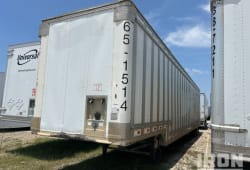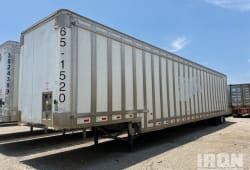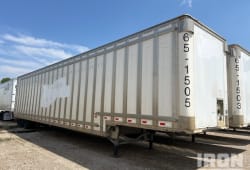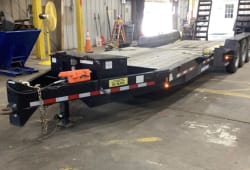Exploring Rebar Dimensions, Strengths, and Variants
3 Min read
)
March 27, 2024
Rebar, short for reinforcing bar, is a steel bar or mesh of steel wires used as a tension device in reinforced concrete and reinforced masonry structures to strengthen and hold the concrete in tension. Its surface is often patterned to form a better bond with the concrete.
:format(webp)) Dimensions and Sizing
Dimensions and Sizing
Rebar diameters vary widely to meet the diverse requirements of construction projects, from light reinforcing to the demands of massive infrastructure. Here's a streamlined overview of common rebar sizes and their applications:
For light reinforcing tasks, 3/8" (#3) rebar is typically used. Standard construction projects often rely on 1/2" (#4) and 5/8" (#5) diameters, while 3/4" (#6) and 1" (#8) are reserved for heavier, more demanding structural needs.
A comprehensive list of rebar sizes includes:
#3 Rebar: 3/8 inch (9.5 mm) diameter, ideal for light reinforcement.
#4 Rebar: 1/2 inch (12.7 mm) diameter, commonly used in standard construction.
#5 Rebar: 5/8 inch (15.9 mm) diameter, also suited for standard projects.
#6 Rebar: 3/4 inch (19.1 mm) diameter, for structures requiring additional strength.
#7 Rebar: 7/8 inch (22.2 mm) diameter, for enhanced structural integrity.
#8 Rebar: 1 inch (25.4 mm) diameter, for heavy-duty applications.
#9 Rebar: 1 1/8 inches (28.7 mm) diameter, for larger construction projects.
#10 Rebar: 1 1/4 inches (31.8 mm) diameter, suitable for significant infrastructure works.
#11 Rebar: 1 3/8 inches (34.9 mm) diameter, for major structural demands.
#14 Rebar: 1 3/4 inches (44.5 mm) diameter, used in heavy construction where superior strength is required.
#18 Rebar: 2 1/4 inches (57.3 mm) diameter, for the most demanding projects where maximum strength and support are crucial.
Each rebar size is engineered to serve specific functions, ranging from supporting residential foundations to reinforcing large-scale infrastructure, ensuring versatility and reliability in the construction industry.
Strengths and Grades
Rebar is categorized into grades that indicate the metal's yield strength - the point at which it begins to deform. The most common grades are:
Grade 40: Offering a minimum yield of 40,000 pounds per square inch (psi), suitable for light commercial and residential applications.
Grade 60: With a yield strength of 60,000 psi, it's the standard for modern construction, providing a balance between strength and flexibility.
These grades ensure that the rebar can support the intended loads without failing, making the selection of the correct grade paramount for safety and durability.
Variants and Their Applications
Beyond standard steel rebar, there are specialized types designed for particular environments and needs, including:
Epoxy-coated rebar, which resists corrosion and is ideal for structures exposed to saltwater or deicing salts.
Welded wire fabric, a mesh used for reinforcing slabs and walls.
Stainless steel rebar, offering the highest resistance to corrosion for extreme environments.
Each variant serves a specific purpose, from preventing rust in harsh climates to reinforcing large, flat surfaces efficiently.
Common Sizes and Pricing
3/8" Dia. (#3) A615 Grade 40 Steel Rebar
Weight/Ft: 0.38 lb
Length: 20 Ft.
Price Each: $10.80
Specifications: Yield Point 40ksi, Tensile Strength 60ksi, Elongation 11%
1/2" Dia. (#4) A615 Grade 40 Steel Rebar
Weight/Ft: 0.67 lb
Length: 20 Ft.
Price Each: $18.00
Specifications: Yield Point 40ksi, Tensile Strength 60ksi, Elongation 11%
5/8" Dia. (#5) A615 Grade 40 Steel Rebar
Weight/Ft: 1.05 lb
Length: 20 Ft.
Price Each: $28.00
Specifications: Yield Point 40ksi, Tensile Strength 60ksi, Elongation 11%
3/4" Dia. (#6) A615 Grade 60 Steel Rebar
Weight/Ft: 1.50 lb
Length: 20 Ft.
Price Each: $40.40
Specifications: Yield Point 60ksi, Tensile Strength 90ksi, Elongation 9%
1" Dia. (#8) A615 Grade 60 Steel Rebar
Weight/Ft: 2.67 lb
Length: 20 Ft.
Price Each: $72.00
Specifications: Yield Point 60ksi, Tensile Strength 90ksi, Elongation 9%

Rex Walz is Boom & Bucket's Manager of Supplier Relations, bringing over a decade of experience in B2B sales and heavy equipment solutions. With a background spanning government, construction, industrial, and commercial sectors, he has a proven track record of driving growth and building trusted customer relationships. At Boom & Bucket, Rex is passionate about helping partners succeed while advancing the company's mission to create the most trusted marketplace for heavy equipment.







